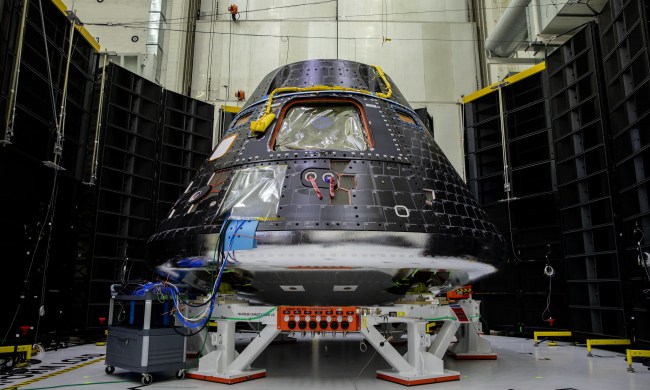NASA has taken a big step toward the launch of the Artemis I moon mission after placing the Orion crew capsule atop the mighty SLS rocket.
The delicate operation was carried out on Wednesday, October 20, at NASA’s Kennedy Space Center in Florida.
“One step closer,” the space agency said in a tweet together with a video showing the the capsule at the top of the rocket. “Orion was lifted and placed atop SLS for the Artemis I mission inside of the Vehicle Assembly Building. Work is currently underway to fully secure the spacecraft to the rocket.”
ONE STEP CLOSER ➡️ Yesterday, @NASA_Orion was lifted and placed atop @NASA_SLS for the #Artemis I mission inside of the Vehicle Assembly Building. Work is currently underway to fully secure the spacecraft to the rocket. Check out the full video: https://t.co/8bCuyJ89pF pic.twitter.com/zLTGctqGS6
— NASA's Kennedy Space Center (@NASAKennedy) October 21, 2021
NASA also posted a set of photos showing Orion in place atop the rocket.
More photos showing the @NASA_Orion spacecraft for the @NASAArtemis I mission, fully assembled with its launch abort system, being lowered on top of the @NASA_SLS rocket in High Bay 3 of the Vehicle Assembly Building at @NASAKennedy in Florida on Oct. 20, 2021. pic.twitter.com/uogRdFac8H
— NASA's Exploration Ground Systems (@NASAGroundSys) October 21, 2021
The highly anticipated Artemis 1 mission is expected to take place early next year. The uncrewed test event will see Orion perform a flyby of the moon before returning to Earth.
Artemis II will follow a similar path but on that mission astronauts will fly aboard the Orion capsule.
Assuming both the rocket and spacecraft function as expected during the first two missions, Artemis III will take the first woman and first person of color to the lunar surface before returning the crew to Earth. NASA had stated a 2024 target date for Artemis III, but delays to the program caused by a variety of issues mean the date is likely to slip.
The fully stacked SLS rocket stands at 322 feet (98.1 meters), which, for context, makes it 17 feet (5.2 meters) taller than the Statue of Liberty.
When it launches from Cape Canaveral in Florida, the rocket’s three boosters will create 8.8 million pounds of thrust, which is 13% more than the space shuttle and 15% more than the Saturn V rocket that powered NASA’s first round of crewed missions to the moon five decades ago.
NASA’s SLS rocket has already undergone extensive ground-based testing. One of the most robust took place in March when engineers fired up the rocket’s core stage for more than eight minutes to simulate an actual launch. The Orion capsule has also undergone a slew of tests in preparation for its first mission in the coming months.


